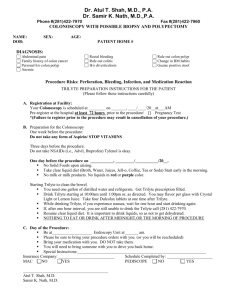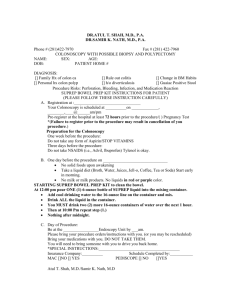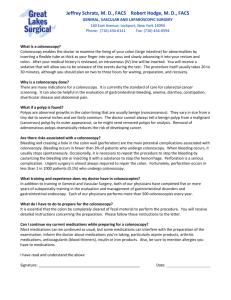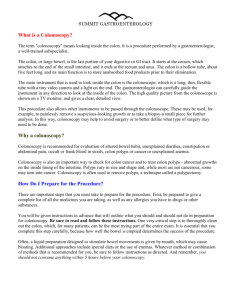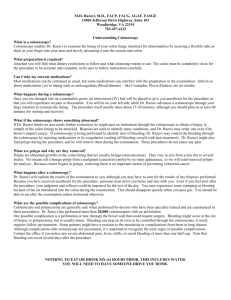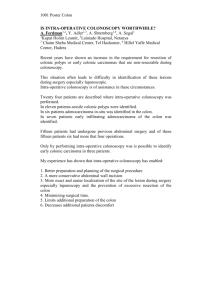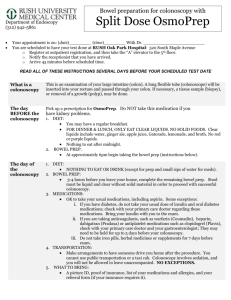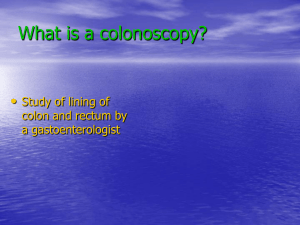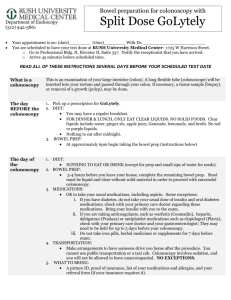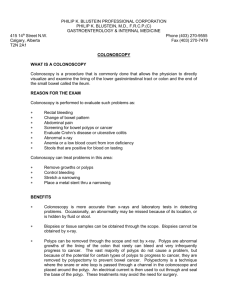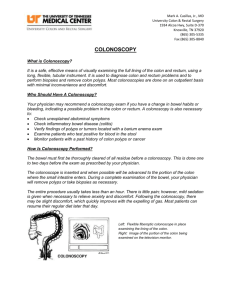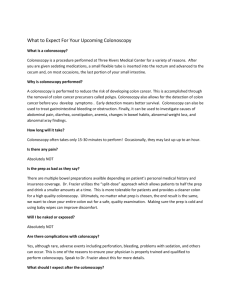Colonoscopy with Suprep Instructions
advertisement
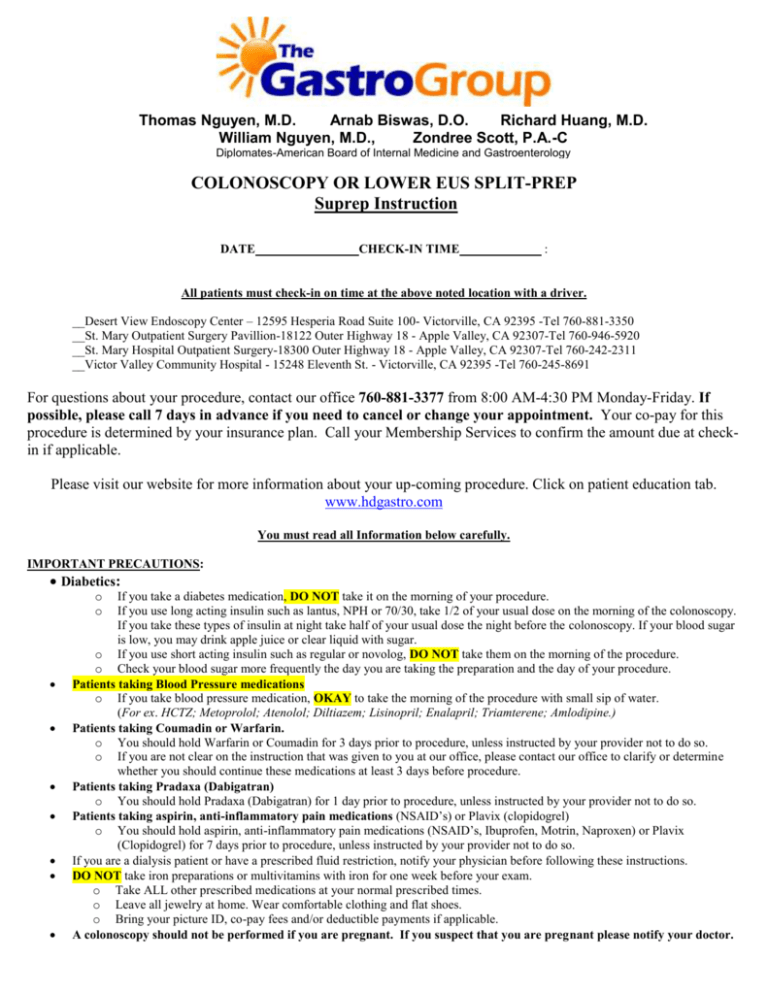
Thomas Nguyen, M.D. Arnab Biswas, D.O. Richard Huang, M.D. William Nguyen, M.D., Zondree Scott, P.A.-C Diplomates-American Board of Internal Medicine and Gastroenterology COLONOSCOPY OR LOWER EUS SPLIT-PREP Suprep Instruction DATE CHECK-IN TIME : All patients must check-in on time at the above noted location with a driver. __Desert View Endoscopy Center – 12595 Hesperia Road Suite 100- Victorville, CA 92395 -Tel 760-881-3350 __St. Mary Outpatient Surgery Pavillion-18122 Outer Highway 18 - Apple Valley, CA 92307-Tel 760-946-5920 __St. Mary Hospital Outpatient Surgery-18300 Outer Highway 18 - Apple Valley, CA 92307-Tel 760-242-2311 __Victor Valley Community Hospital - 15248 Eleventh St. - Victorville, CA 92395 -Tel 760-245-8691 For questions about your procedure, contact our office 760-881-3377 from 8:00 AM-4:30 PM Monday-Friday. If possible, please call 7 days in advance if you need to cancel or change your appointment. Your co-pay for this procedure is determined by your insurance plan. Call your Membership Services to confirm the amount due at checkin if applicable. Please visit our website for more information about your up-coming procedure. Click on patient education tab. www.hdgastro.com You must read all Information below carefully. IMPORTANT PRECAUTIONS: Diabetics: o o If you take a diabetes medication, DO NOT take it on the morning of your procedure. If you use long acting insulin such as lantus, NPH or 70/30, take 1/2 of your usual dose on the morning of the colonoscopy. If you take these types of insulin at night take half of your usual dose the night before the colonoscopy. If your blood sugar is low, you may drink apple juice or clear liquid with sugar. o If you use short acting insulin such as regular or novolog, DO NOT take them on the morning of the procedure. o Check your blood sugar more frequently the day you are taking the preparation and the day of your procedure. Patients taking Blood Pressure medications o If you take blood pressure medication, OKAY to take the morning of the procedure with small sip of water. (For ex. HCTZ; Metoprolol; Atenolol; Diltiazem; Lisinopril; Enalapril; Triamterene; Amlodipine.) Patients taking Coumadin or Warfarin. o You should hold Warfarin or Coumadin for 3 days prior to procedure, unless instructed by your provider not to do so. o If you are not clear on the instruction that was given to you at our office, please contact our office to clarify or determine whether you should continue these medications at least 3 days before procedure. Patients taking Pradaxa (Dabigatran) o You should hold Pradaxa (Dabigatran) for 1 day prior to procedure, unless instructed by your provider not to do so. Patients taking aspirin, anti-inflammatory pain medications (NSAID’s) or Plavix (clopidogrel) o You should hold aspirin, anti-inflammatory pain medications (NSAID’s, Ibuprofen, Motrin, Naproxen) or Plavix (Clopidogrel) for 7 days prior to procedure, unless instructed by your provider not to do so. If you are a dialysis patient or have a prescribed fluid restriction, notify your physician before following these instructions. DO NOT take iron preparations or multivitamins with iron for one week before your exam. o Take ALL other prescribed medications at your normal prescribed times. o Leave all jewelry at home. Wear comfortable clothing and flat shoes. o Bring your picture ID, co-pay fees and/or deductible payments if applicable. A colonoscopy should not be performed if you are pregnant. If you suspect that you are pregnant please notify your doctor. The bowel preparation and diet are explained below. Please follow the instructions exactly as they are written here. Your bowel must be thoroughly clean before the exam. DIET INSTRUCTIONS: 1. Stop eating solid food 24 hours (1 day) prior to your exam. (For ex. if your exam is scheduled on Monday, stop eating solid foods on Sunday.) 2. Begin a clear liquid diet once you stop solid food. Have only clear liquids for 1 day. Breakfast, lunch, dinner & snacks must all be clear liquids. (For ex. of clear liquids include: broth, black coffee (1cup) or tea (avoid milk or cream), Jell-O, popsicles, or Gatorade, 7-UP, Ginger-ale, apple, white grape, or cranberry juice, etc.) NO DARK COLORS (For ex. Red blue, purple or green) (Avoid juices with pulp.) In addition to your clear liquid diet, drink 6-8 glasses of water each day to help promote bowel cleansing. 3. For 3 hours before your scheduled exam time, have NOTHING BY MOUTH, with the exception of medications with a small sip of water. (For ex. if your exam is scheduled for 8 am, do not take anything by mouth after 5 AM; if your exam is scheduled for 1:30 pm, do not take anything by mouth after 10:30 AM the morning of your exam, etc.) 4. REMEMBER, NOTHING BY MOUTH 3 HOURS BEFORE YOUR SCHEDULED EXAM BOWEL PREP INSTRUCTIONS: Please see attached sheet for Suprep Instruction. IT IS REQUIRED THAT SOMEONE DRIVES YOU TO AND FROM YOUR APPOINTMENT The sedation you will receive during the procedure will cause you to become drowsy and possibly forgetful. Although you will feel well, you can NOT drive for 12 hours after the procedure. Plan to take the rest of the day off work or school. Avoid making important decisions during these 12 hours. To reduce possible nausea and vomiting, resume eating gradually with easily digested foods for your first meal. WHAT IS A COLONOSCOPY? A colonoscope is a long flexible tube that is about the thickness of a finger. It is inserted through the rectum into the large intestine (colon) and allows the physician to carefully examine the lining of the colon. If the physician sees a suspicious area or needs to evaluate an area of inflammation in greater detail, an instrument can be passed through the colonoscope to obtain a small tissue sample (a biopsy or brushing). Samples are taken for many reasons and don’t necessarily mean that cancer is suspected. WHAT SHOULD YOU EXPECT DURING THE PROCEDURE? Your doctor will give you medication through a vein to make you relaxed, sleepy and comfortable. While you are lying on your left side, the colonoscope is inserted into the rectum and gradually advanced through the colon while the lining is examined thoroughly. The procedure is well tolerated. Many patients even fall asleep during the examination. If there is some discomfort during colonoscopy, it is usually mild. In rare cases, passage of the colonoscope through the entire colon cannot be achieved. A limited examination may be sufficient if all areas of suspected abnormality were well visualized. It takes approximately 30-45 minutes for the physician to perform your procedure. After the examination, you will remain in the recovery area for about one hour. WHAT IS POLYPECTOMY? During the course of the examination, a polyp may be found. Polyps are abnormal growths of tissue, which vary in size from a tiny dot to several inches. If your doctor feels that removal of the polyp is indicated, he may pass a wire snare through the colonoscope and sever the attachment of the polyp from the intestinal wall by means of an electrical current. You shouldn’t feel any pain during the removal of the polyp. Polyps are usually removed because they can cause rectal bleeding or contain cancer. Although the majority of polyps are non-cancerous, a small percentage may contain an area of cancer in them or may develop into cancer. Removal of colon polyps, therefore, is an important means of prevention and cure of colon cancer, which is a leading form of cancer in the United States. WHAT COMPLICATIONS CAN OCCUR FROM COLONOSCOPY & POLYPECTOMY? Colonoscopy and polypectomy are safe and associated with very low risk when performed by physicians who have been specially trained and are experienced in this endoscopic procedure. One possible complication is perforation in which a tear through the wall of the bowel may allow leakage of intestinal fluid. This complication usually requires surgery but may be managed with antibiotics and IV fluids in selected cases. Bleeding may occur from the site of biopsy or polyp removal. It is usually minor and stops on its own or can be controlled by cauterization (application of electrical current) through the colonoscope. Rarely, transfusions or surgery may be required. Other risks include drug reactions and complications from unrelated diseases such as heart or lung disease leading to heart attack or stroke. Death is extremely rare, but remains a remote possibility.
